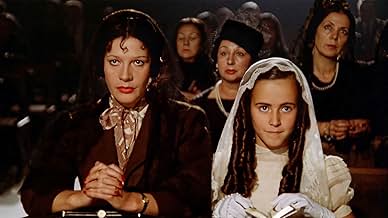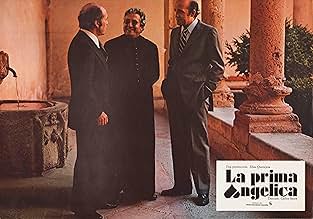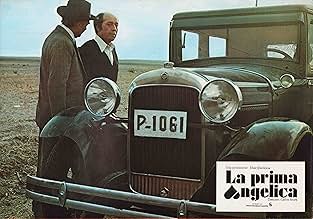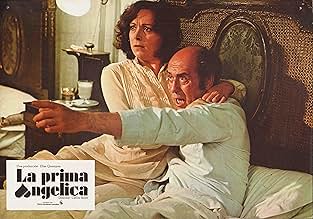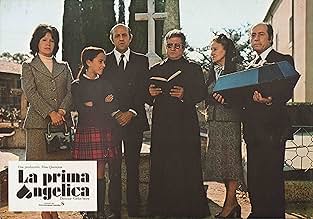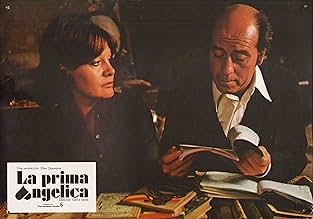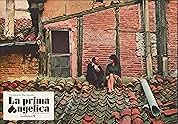La prima Angélica
- 1974
- 1h 47min
CALIFICACIÓN DE IMDb
7.3/10
1.3 k
TU CALIFICACIÓN
Agrega una trama en tu idiomaAfter being given permission to re-inter his mother's body in their family vault, a middle-aged man who survived the Spanish Civil War as a child returns home and relives old memories.After being given permission to re-inter his mother's body in their family vault, a middle-aged man who survived the Spanish Civil War as a child returns home and relives old memories.After being given permission to re-inter his mother's body in their family vault, a middle-aged man who survived the Spanish Civil War as a child returns home and relives old memories.
- Dirección
- Guionistas
- Elenco
- Premios
- 2 premios ganados y 2 nominaciones en total
José Luis López Vázquez
- Luis
- (as Jose Luis Lopez Vazquez)
María Clara Fernández de Loaysa
- Angélica niña
- (as Mª Clara Fernandez de Loyasa)
María de la Riva
- Abuela
- (as Maria de la Riva)
Antonio Canal
- Soldado
- (as Tony Canal)
José Luis Heredia
- Felipe Sagún
- (as Jose L. Heredia)
Opiniones destacadas
Cousin Angélica was Saura's first real success, favored by the riots and scandals caused by its premiere. Taking up the theme and allegorical style of The Garden of Earthly Delights, here Saura makes his most explicitly political film.
From The Garden of Delights, he recovers several actors, first of all his main actor, a José Luis López Vázquez who tried to prove acting skills that went far beyond the mostly silly comedies (but let's not forget his collaborations with Ferreri or García Berlanga with very critical and no nonsense scripts by Azcona) that abounded so much in Spanish commercial cinema of the sixties and seventies.
There are cinephile winks to this previous film (for example in a scene when the protagonist do not choose the green tie), very much to the director's sometimes crude and sufficient taste.
Structurally, it is a complex film, where the use of the same girl to play the two Angélicas, as well as López Vázquez to play the adult and child Luis, allow Saura interesting temporal transitions, within a clear desire to show undeniable virtuosity in adapting to the cinematographic medium the modernist innovations in this aspect that in the literary field had been resurrected and exploited with absolute genius by the great authors of the Latin American Boom (Vargas Llosa, Fuentes, Donoso...) and were also in vogue among some Spanish avant-garde writers of the time (the Goytisolo or Marsé for example).
What hinders La prima Angélica, as in general all the work of this epoc of the director, is the insistence on the symbolic, the allegory, in a sufficient and pedantic tone that it transmits to its characters, putting in their mouths an artificial language and making them assume poses of unbearable affectation.
Saura has an undoubted (but we are not sure if always welcome) talent for transmitting the transcendent content of a scene, and in his best moments he can masterfully make both planes coexist, for example, the last scene of the film (partly also because of this privileged position in the narrative), where various decisions by the director (among them the use of López Vázquez as a young Luisito) add layers of meaning to the basic content of the scene, and we are no longer alone in the unjust and cruel punishment of the child by his uncle, nor in the allegorical meaning of the revenge of the national side on the republicans after the war, but also and perhaps above all the unhealed wounds, the punishment and the revenge experienced, even unconsciosly, day after day by the protagonist in his adult life.
López Vázquez, as in The Garden of Delights, finds himself with a difficult role that could be a poisoned gift. As a child it can be moving, for example in that first scene with the parents on the road to Segovia, but mostly it is, not entirely intentionally we fear, just laughable. Faced with the often bombastic and affected phrases that Saura puts in his mouth (that awful explanation about Proust!), López Vázquez, more accustomed to comedy, seems only able to face them with a pedantic tone of a ridiculous little man. His performance is alternately brilliant and ridiculous, though frankly I can't imagine any other actor who could pull off the role more convincingly.
In any case, Saura's decision not to shoot with a child Luis, but to make the adult Luis coexist in two temporary spaces (no longer, as in Bergman's Smultronstället only as a witness, but interacting with the rest of the characters, as in Fellini's 81/2), is undoubtedly one of the greatest ideas of the film (and of great psychological truth it seems to me), but very risky in its execution and with irregular results.
As for the political content of the film, naturally the right-wing characters, representing an entire ideology, are shown as an example of cruelty, cowardice, insensitivity, selfishness and hypocrisy. But by identifying the cruelty of the regime with the human values of the people who fought in that side, he introduced a Manichean vision that unfortunately had as much presence in post-dictatorship cinema as the opposite position had in the terrible 1940s.
And finally, after an hour, the film enters a major bump, inevitable in the face of so much insistent symbology that does not include new developments and whose scope is already completely exhausted, but even so it picks up pace in the last scenes and the ending is certainly achieved.
Altogether, one of Saura's great titles, with the undoubted virtues, but the obvious general defects (artificiality, pedantry, pomposity), at this stage of his work, which should be seen at least for the historical importance of the film and for being risky and innovative both conceptually and formally.
From The Garden of Delights, he recovers several actors, first of all his main actor, a José Luis López Vázquez who tried to prove acting skills that went far beyond the mostly silly comedies (but let's not forget his collaborations with Ferreri or García Berlanga with very critical and no nonsense scripts by Azcona) that abounded so much in Spanish commercial cinema of the sixties and seventies.
There are cinephile winks to this previous film (for example in a scene when the protagonist do not choose the green tie), very much to the director's sometimes crude and sufficient taste.
Structurally, it is a complex film, where the use of the same girl to play the two Angélicas, as well as López Vázquez to play the adult and child Luis, allow Saura interesting temporal transitions, within a clear desire to show undeniable virtuosity in adapting to the cinematographic medium the modernist innovations in this aspect that in the literary field had been resurrected and exploited with absolute genius by the great authors of the Latin American Boom (Vargas Llosa, Fuentes, Donoso...) and were also in vogue among some Spanish avant-garde writers of the time (the Goytisolo or Marsé for example).
What hinders La prima Angélica, as in general all the work of this epoc of the director, is the insistence on the symbolic, the allegory, in a sufficient and pedantic tone that it transmits to its characters, putting in their mouths an artificial language and making them assume poses of unbearable affectation.
Saura has an undoubted (but we are not sure if always welcome) talent for transmitting the transcendent content of a scene, and in his best moments he can masterfully make both planes coexist, for example, the last scene of the film (partly also because of this privileged position in the narrative), where various decisions by the director (among them the use of López Vázquez as a young Luisito) add layers of meaning to the basic content of the scene, and we are no longer alone in the unjust and cruel punishment of the child by his uncle, nor in the allegorical meaning of the revenge of the national side on the republicans after the war, but also and perhaps above all the unhealed wounds, the punishment and the revenge experienced, even unconsciosly, day after day by the protagonist in his adult life.
López Vázquez, as in The Garden of Delights, finds himself with a difficult role that could be a poisoned gift. As a child it can be moving, for example in that first scene with the parents on the road to Segovia, but mostly it is, not entirely intentionally we fear, just laughable. Faced with the often bombastic and affected phrases that Saura puts in his mouth (that awful explanation about Proust!), López Vázquez, more accustomed to comedy, seems only able to face them with a pedantic tone of a ridiculous little man. His performance is alternately brilliant and ridiculous, though frankly I can't imagine any other actor who could pull off the role more convincingly.
In any case, Saura's decision not to shoot with a child Luis, but to make the adult Luis coexist in two temporary spaces (no longer, as in Bergman's Smultronstället only as a witness, but interacting with the rest of the characters, as in Fellini's 81/2), is undoubtedly one of the greatest ideas of the film (and of great psychological truth it seems to me), but very risky in its execution and with irregular results.
As for the political content of the film, naturally the right-wing characters, representing an entire ideology, are shown as an example of cruelty, cowardice, insensitivity, selfishness and hypocrisy. But by identifying the cruelty of the regime with the human values of the people who fought in that side, he introduced a Manichean vision that unfortunately had as much presence in post-dictatorship cinema as the opposite position had in the terrible 1940s.
And finally, after an hour, the film enters a major bump, inevitable in the face of so much insistent symbology that does not include new developments and whose scope is already completely exhausted, but even so it picks up pace in the last scenes and the ending is certainly achieved.
Altogether, one of Saura's great titles, with the undoubted virtues, but the obvious general defects (artificiality, pedantry, pomposity), at this stage of his work, which should be seen at least for the historical importance of the film and for being risky and innovative both conceptually and formally.
For this year, I have decided to concentrate on movies favourably appraised by the two guides I grew up with – Leslie Halliwell's and Leonard Maltin's – or were otherwise mentioned in a couple of polls ranking the top films of all time. With this in mind, of about a score of Saura titles in my possession and which I had opted to schedule for viewing on the occasion of his birthday, the number has been reduced to just 5 – and these are not necessarily among his more renowned or even intriguing efforts!
The film under review falls, to my mind, in the latter category – despite its having won the Jury Prize at Cannes. Having now watched it for myself, there is no doubt that COUSIN ANGELICA is indeed worthy of merit; however, I must also admit that it was rather heavy-going an experience for a number of reasons. First off, it seems to me that certain native film-makers are obsessed with the Spanish Civil War – since it regularly features in their work (as here), and yet the conflict eventually comes to have no real bearing on the central plot! In the same vein, there is a distinct whiff of anti-clericalism (including nightmarish visions of a worm-infested and stigmata-bearing nun) running through it but, again, no specific point is being made by this stance!
Incidentally, I wonder why such an ordinary title (which also misleadingly equates it with a contemporaneous sub-genre in Italian cinema!) was chosen for a film that is essentially so rich in subtext – relating to the impossible love affair at the heart of the narrative between the single protagonist and his unhappily married cousin – especially since several actors play multiple roles throughout while the hero remains the same, i.e. middle-aged, the entire time (even when supposed to be a child and, at one point, gets to see himself as he is imagining a meeting with his own long-dead parents)! Curiously enough, the end titles reveal that the film was dedicated to Charles and Oona Chaplin, the parents of Saura's then-companion (and frequent collaborator) Geraldine who, however, does not appear in this one...and I do wonder what the British comic made of the whole thing!
The film under review falls, to my mind, in the latter category – despite its having won the Jury Prize at Cannes. Having now watched it for myself, there is no doubt that COUSIN ANGELICA is indeed worthy of merit; however, I must also admit that it was rather heavy-going an experience for a number of reasons. First off, it seems to me that certain native film-makers are obsessed with the Spanish Civil War – since it regularly features in their work (as here), and yet the conflict eventually comes to have no real bearing on the central plot! In the same vein, there is a distinct whiff of anti-clericalism (including nightmarish visions of a worm-infested and stigmata-bearing nun) running through it but, again, no specific point is being made by this stance!
Incidentally, I wonder why such an ordinary title (which also misleadingly equates it with a contemporaneous sub-genre in Italian cinema!) was chosen for a film that is essentially so rich in subtext – relating to the impossible love affair at the heart of the narrative between the single protagonist and his unhappily married cousin – especially since several actors play multiple roles throughout while the hero remains the same, i.e. middle-aged, the entire time (even when supposed to be a child and, at one point, gets to see himself as he is imagining a meeting with his own long-dead parents)! Curiously enough, the end titles reveal that the film was dedicated to Charles and Oona Chaplin, the parents of Saura's then-companion (and frequent collaborator) Geraldine who, however, does not appear in this one...and I do wonder what the British comic made of the whole thing!
When the single middle-aged Luis (José Luis López Vázquez) travels from Barcelona to bury the remains of his mother in the vault of his family in Segovia, he is lodged by his aunt Pilar (Lola Cardona) in her old house where he spent his summer of 1936 with her. He meets his cousin Angelica, who was his first love, living on the first floor with her husband and daughter, and he recalls his childhood in times of the Spanish Civil War entwined with the present.
This sensitive movie is a touching love story having the background of the beginning of the Spanish Civil War with the coup d'État of General Francisco Franco in July 1936. The original resource of Carlos Saura, using the same actor (José Luis López Vázquez) representing the boy and the man, is awesome. The forbidden love for his cousin, the dogmatic education of the Catholic Church, the relationship with his family are revived by Luis in this simple and unknown gem. My vote is seven.
Title (Brazil): "A Prima Angélica" ("The Cousin Angelica")
This sensitive movie is a touching love story having the background of the beginning of the Spanish Civil War with the coup d'État of General Francisco Franco in July 1936. The original resource of Carlos Saura, using the same actor (José Luis López Vázquez) representing the boy and the man, is awesome. The forbidden love for his cousin, the dogmatic education of the Catholic Church, the relationship with his family are revived by Luis in this simple and unknown gem. My vote is seven.
Title (Brazil): "A Prima Angélica" ("The Cousin Angelica")
"La prima Angélica" (1974) is one of the most sensitive and important movies of Carlos Saura. Set in 1974, one of the most transcendental moments in Spain with the debacle of franquism, the film is a wonderful portrayal of the effects of the Spanish civil war in a family and the love that Luis -great José Luis López Vázquez- feels about his cousine Angélica -beautiful Lina Canalejas-. The childhood, the adolescence of both -Luis and Angélica- and their forbidden love is seen in the past and in the present with a nice nostalghia. Carlos Saura creates a great love story with an historical background -spanish civil war- and shows to the audience a passional game between past and present reality. "La prima Angélica" is for me one of the most important movies of the Spanish Cinema. This is one of the masterpieces of Carlos Saura.
Carlos Saura's provocative COUSIN ANGELICA stirred a vehement protest from the Spanish Right upon its release during the twilight years of Francisco Franco's dictatorship. The film focuses on Luis (Vázquez), an unmarried, middle-aged business man in Barcelona, bringing his long-deceased mother's bones to bury in her family crypt in Sevogia. En route, past memories well up, he begin to re-enact the events happened almost forty-years ago during the Spanish Civil War, his days of sojourn with his mother's family, includes his first cousin Angelica (played by Canakejas as the adult and de Loaysa as the child), his first love.
The most unconventional tack is that Saura decides to let Vázquez play both the adult and child version of Luis, while Canalejas, Delgado and de Loaysa play two nuclear families in both time- lines: Angelica's family in the present, and the one during the wartime, a 9-year-old Angelica and her parents. This stipulation evidently creates some initial puzzlement and requires viewers more patience to get the narrative which frequently jumps back-and-forth. And one key giveaway is Vázquez's performance, who can convincingly switch between a grown-up's urbane refinement and a child's wide-eyed obedience, the latter is quite demanding for an actor is his fifties.
Recollections are intermingled with Luis' present mental state, gradually, audience will be notified there is a deep chasm between his father and his mother's family, they are on opposite sides in political slants during that tempestuous time, his parents are called the black sheep of the family, which corners Luis in an awkward situation staying with them, where family bond is virtually marred by politics.
However, the puppy love with Angelica symbolises the most innocent and beautiful souvenir in this experience, a stolen kiss, being each other's playmates, sharply contrasts with the marriage fetters she is entrapped in presently, rekindled romance glistens faintly, but eventually he is not the knight in shining armour, the sadness of adulthood.
Saura also registers strongly with symbolically religious projections which has poisoned and continues haunting Luis' psyche to date, the mortified nun, with a lock sealing her lips, and a bleeding hole in her palm, is his incubus, which is startling to watch. A priest's inculcation of a 11-year-old boy's tragic death from an explosion is bordering on sheer hectoring, and the ensuing bombarding in the school echoes the opening shots, which at first glance resemble an atmospheric modern-dancing rendition.
With hindsight, COUSIN ANGELICA seems to be less pungent in its anti-war and religion innuendos by nowadays' criterions, other than a beguilingly concocted labyrinth juxtaposing disjointed memories with a disillusioned reality, but sometimes it is overcautious to lay bare the elephant-in-the-room, whereas in other time, over-mystifying the machination of reminiscence.
The most unconventional tack is that Saura decides to let Vázquez play both the adult and child version of Luis, while Canalejas, Delgado and de Loaysa play two nuclear families in both time- lines: Angelica's family in the present, and the one during the wartime, a 9-year-old Angelica and her parents. This stipulation evidently creates some initial puzzlement and requires viewers more patience to get the narrative which frequently jumps back-and-forth. And one key giveaway is Vázquez's performance, who can convincingly switch between a grown-up's urbane refinement and a child's wide-eyed obedience, the latter is quite demanding for an actor is his fifties.
Recollections are intermingled with Luis' present mental state, gradually, audience will be notified there is a deep chasm between his father and his mother's family, they are on opposite sides in political slants during that tempestuous time, his parents are called the black sheep of the family, which corners Luis in an awkward situation staying with them, where family bond is virtually marred by politics.
However, the puppy love with Angelica symbolises the most innocent and beautiful souvenir in this experience, a stolen kiss, being each other's playmates, sharply contrasts with the marriage fetters she is entrapped in presently, rekindled romance glistens faintly, but eventually he is not the knight in shining armour, the sadness of adulthood.
Saura also registers strongly with symbolically religious projections which has poisoned and continues haunting Luis' psyche to date, the mortified nun, with a lock sealing her lips, and a bleeding hole in her palm, is his incubus, which is startling to watch. A priest's inculcation of a 11-year-old boy's tragic death from an explosion is bordering on sheer hectoring, and the ensuing bombarding in the school echoes the opening shots, which at first glance resemble an atmospheric modern-dancing rendition.
With hindsight, COUSIN ANGELICA seems to be less pungent in its anti-war and religion innuendos by nowadays' criterions, other than a beguilingly concocted labyrinth juxtaposing disjointed memories with a disillusioned reality, but sometimes it is overcautious to lay bare the elephant-in-the-room, whereas in other time, over-mystifying the machination of reminiscence.
¿Sabías que…?
- TriviaThe film is dedicated to Oona and Charlie. The names refer to Oona Chaplin and Charles Chaplin, the parents of Geraldine Chaplin, Carlos Saura's partner by the time of release of the film.
- ConexionesReferenced in Saura(s) (2017)
- Bandas sonorasRocío
Written by Rafael de León (as León) and Manuel L. Quiroga (as Quiroga)
Performed by Imperio Argentina
Selecciones populares
Inicia sesión para calificar y agrega a la lista de videos para obtener recomendaciones personalizadas
- How long is Cousin Angelica?Con tecnología de Alexa
Detalles
- Fecha de lanzamiento
- País de origen
- Sitio oficial
- Idioma
- También se conoce como
- Cousin Angelica
- Locaciones de filmación
- Plaza Mayor, Segovia, Castilla y León, España(hotel exteriors)
- Productora
- Ver más créditos de la compañía en IMDbPro
- Tiempo de ejecución1 hora 47 minutos
- Mezcla de sonido
- Relación de aspecto
- 1.66 : 1
Contribuir a esta página
Sugiere una edición o agrega el contenido que falta

Principales brechas de datos
By what name was La prima Angélica (1974) officially released in Canada in English?
Responda
